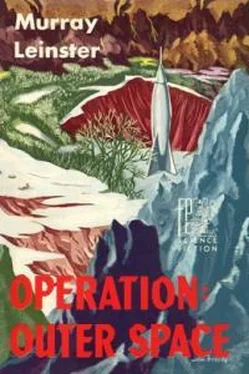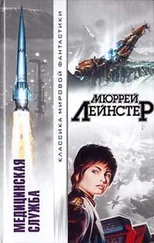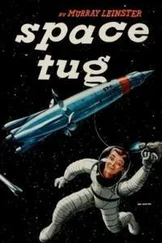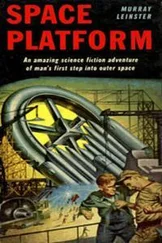This comforting conclusion took a long time to work out. Meanwhile Babs and Cochrane had swung down to the ground and went hiking. Cochrane was armed as before, though he had no experience as a marksman. In television shows he had directed the firing of weapons shooting blank charges—cut to a minimum so they wouldn't blast the mikes. He knew what motions to go through, but nothing else.
They did not explore in the same direction as their first excursion. The ship was to take off presently, as soon as this planet had turned enough for the space–ship's nose to point nearly in the direction of their next target. They had two hours for exploration.
They came upon something which lay still across their path, like a great serpent. Cochrane looked at it startledly. Then he saw that the round, glistening seeming snake was fastened to the ground by rootlets. It was a plant which grew like a creeper, absorbing nourishment from a vast root–area. Somewhere, no doubt, it would rear upward and spread out leaves to absorb the sun's light. It used, in a way, the principle of those lateral wells which in dry climates gather water too scarce to collect in merely vertical holes.
They went on and on, admiring and amazed. All about them were curiosities of adaptation, freaks of ecological adjustment, marvels of symbiotic cooperation. A botanist would have swooned with joy at the material all about. A biologist would have babbled happily. Babs and Cochrane admired without information. They walked interestedly but unawed among the unparalleled. Back on Earth they knew as much as most people about nature—practically nothing at all. Babs had never seen any wild plants before. She was fascinated by what she saw, and exclaimed at everything. But she did not realize a fraction of the marvels on which her eyes rested. On the whole, she survived.
"It's a pity we haven't got a helicopter," Cochrane said regretfully. "If we could fly around from place to place, and send back pictures … We can't do it in the ship … It would burn more fuel than we've got."
Babs wrinkled her forehead.
"Doctor Holden's badly worried because we can't make as alluring a picture as he'd like."
Cochrane halted, to watch something which was flat like a disk of gray–green flesh and which moved slowly out of their path with disquieting writhing motions. It vanished, and he said:
"Yes. Bill's an honest man, even if he is a psychiatrist. He wants desperately to do something for the poor devils back home who're so pitifully frustrated. There are tens of millions of men who can't hope for anything better than to keep the food and shelter supply intact for themselves and their families. They can't even pretend to hope for more than that. There isn't more than so much to go around. But Bill wants to give them hope. He figures that without hope the world will turn madhouse in another generation. It will."
"You're trying to do something about that!" said Babs quickly. "Don't you think you're offering hope to everybody back on Earth?"
"No!" snapped Cochrane. "I'm not trying anything so abstract as furnishing hope to a frustrated humanity! Nobody can supply an abstraction! Nobody can accomplish an abstraction! Everything that's actually done is specific and real! Maybe you can find abstract qualities in it after it's done, but I'm a practical man! I'm not trying to produce an improved psychological climate, suitable for debilitated psychos! I'm trying to get a job done!"
"I've wondered," admitted Babs, "what the job is."
Cochrane grimaced.
"You wouldn't believe it, Babs."
There was an odd quivering underfoot. Trees shook. There was no other peculiarity anywhere. Nothing fell. No rocks rolled. In a valley among volcanoes, where the smoke from no less than six cones could be seen at once, temblors would not do damage. What damage mild shakings could do would have been done centuries since.
Babs said uneasily:
"That feels—queer, doesn't it?"
Cochrane nodded. But just as he and Babs had never been conditioned to be afraid of animals, they had been conditioned by air–travel at home and space–travel to here against alarm at movements of their surroundings. Temblors were evidently frequent at this place. Trees were anchored against them as against prevailing winds in exposed situations. Landslides did not remain poised to fall. Really unstable slopes had been shaken down long ago.
"I wish we had a helicopter," Cochrane repeated. "The look of the mountains as we came down, with glaciers between the smoking cones—that was good show–stuff! We could have held interest here until we worked that naming contest. We could use the extra capital that would bring in! As it is, we've got to move on with practically nothing accomplished. The trouble is that I didn't think we would succeed as we have! Heaven knows I could have gotten helicopters!"
He helped her up a small steep incline, where rock protruded from a hillside.
The ground trembled again. Not alarmingly, but Babs' hold of his hand tightened a little. They continued to climb. They came out atop a small bare prominence which rose above the forest. Here they could see over the treetops in a truly extensive view. The mountains all about were clearly visible. Some were ten and some twenty miles away. Some, still farther, were barely visible in the thin haze of distance. But there was a thick pall of smoke hovering about one of the farthest. It was mushroom–shaped. At one time in human history, it would have seemed typically a volcanic cloud. To Cochrane and Babs, it was typically the cloud of an atomic explosion.
The ground shook sharply underfoot. Babs staggered.
Flying things rose from the forests in swarms. They hovered and darted and flapped above the tree–tops. Temblors did not alarm the creatures of the valley. But ground–shocks like this last were another matter.
A great tree, rearing above its fellows, toppled slowly. With ripping, tearing noises, it bent sedately toward the smoking, far–away mountain. It crashed thunderously down upon smaller trees. There were other rending noises. The flying things rose higher, seeming agitated. Echoes sounded in the ears of the two atop the hill.
There was another sharp shock. Babs gave a little, inarticulate cry. She pointed.
There was much smoke in the distance. Over the far–away cone, which was indistinct in the smoke of its own making—over the edge of the distant mountains a glare appeared. It was a thin line of bright white light. With infinite deliberation it began to creep down the slanting, blessedly remote mountainside.
The ground seemed to shift abruptly, and then shift back. Across and down the valley, five miles away, a portion of the stony wall detached itself and slid downward in seeming slow motion. Two more great trees made ripping sounds. One crashed. There was an enormous darkness above one part of the sky. Its under side glowed from fires as of hell, in the crater beneath it. There were sparkings above the mountaintop.
Very oddly indeed, the sky overhead was peacefully blue. But at the horizon a sheet of fire rolled down mile–long slopes. It seemed to move with infinite deliberation, but to move visibly at such a distance it must have been traveling like an express–train. It must have been unthinkably hot, glaring–white molten stone, thin as water, pouring downward in a flood of fire.
There was no longer a sensation of the ground trembling underfoot. Now the noticeable sensation was when the ground was still. Temblors were practically continuous. There were distinct sharp impacts, as of violent blows nearby.
Babs stared, fascinated. She glanced up at Cochrane. His skin was white. There were beads of sweat on his forehead.
"We're safe here, aren't we?" she asked, scared.
"I think so. But I'm not going to take you through falling trees while this is going on! There's another tree down! I'm worrying about the ship! If it topples—."
Читать дальше






